All-season tires are a game-changer for everyday drives and commutes, offering the perfect blend of features and performance for various vehicle types. For those who don’t know what are all-season tires, an all-season tire is specifically designed to provide reliable traction and handling in a wide range of temperatures and mild weather conditions.
That means no more switching between summer and winter tires. These versatile options are designed to conquer different driving conditions, from winter weather to wet roads and summer.
The market is brimming with tire models, but our expert team has handpicked the best based on reputation, tread life, and affordability.
No matter the weather conditions or temperatures, you can trust these all-season tires to keep your ride smooth and safe. Plus, most of them in the list are cost-effective solutions for drivers seeking a single set of tires for year-round use.
Pro Tip: Most modern cars come with all-season tires as original equipment. So, check your tires before thinking about buying a new set of all-season tires.
Table of Contents
Details of the 10 Best All-Season Tires of 2024
1. Michelin Defender LTX M/S
Michelin Defender LTX M/S stands out for its unmatched versatility. The reason for being best overall is that it’s not just great for on-road performance, but also excels in light off-road conditions. it comes with a 6-year or 70,000-mile warranty for T- and H-speed rated tires, and a 6-year or 50,000-mile warranty for R-speed rated tires and a 60-day satisfaction guarantee.
Pros
Cons
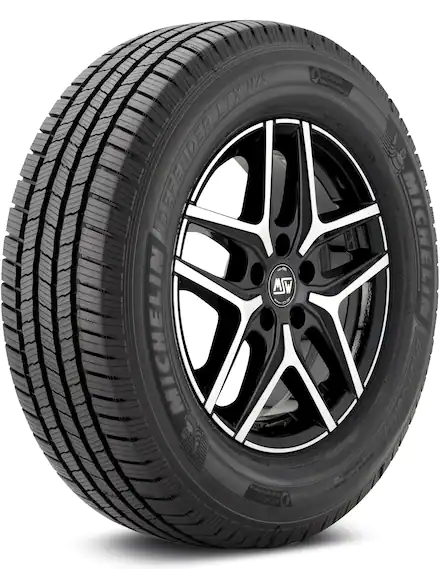
Overall Rating
| Treadwear | 9.3 |
| Dry Traction | 9.6 |
| Wet Traction | 9.3 |
| Winter Performance | 8.7 |
| Noise and Comfort | 9.1 |
| Price | 8.4 |
Our Verdict
Out top pick, the Michelin Defender LTX M/S delivers year-round traction and exceptional grip on wet and dry surfaces.
One of its strengths is its durability and tread life, thanks to the Evertread compound made of black carbon and silica. This feature improves upon the previous LTX M/S 2 model. The multiple lateral grooves also enhance braking performance, giving you a safer drive.
The Defender LTX M/S offers solid traction in light snow, though it's not recommended for deep snow and icy roads.
Keep in mind, the LTX M/S isn't three-peak mountain snowflake (3PMSF) rated. However, if you're looking for an all-season tire that can handle most conditions and terrains, the Michelin Defender LTX M/S is an excellent choice.
A few customers reported early sidewall cracking, possibly due to excessive off-roading, overloading, or sun exposure. However, most buyers rave about its all-weather performance, making it a best-selling Michelin tire. Many users even report over 100,000 miles of tread life!
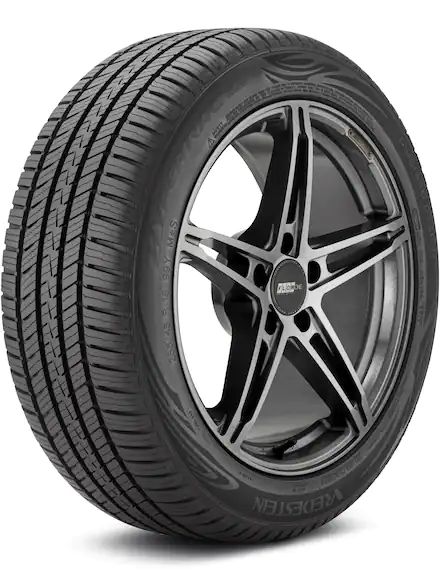
2. Vredestein Hypertrac All Season
The Vredestein Hypertrac All Season is the go-to choice for those seeking ultra-high performance and handling. Developed for sports cars, sedans, and coupes, this tire's specialty lies in its exceptional wet traction. Boasting an 8-year or 50,000-mile warranty from the date of production, and a 100-day trial period, you can trust the quality of this all-season tire.
Overall Rating
| Treadwear | 8.8 |
| Dry Traction | 9.4 |
| Wet Traction | 9.2 |
| Winter Performance | 8.6 |
| Noise and Comfort | 8.9 |
| Price | 9.3 |
Pros
Cons
Our Verdict
The manufacturer has enhanced the wet traction of Vredestein Hypertrac All Season by updating the tire's compound with a new polymer blend, improving the groove design, and adding zigzag sipes for superior grip on wet roads.
However, it's important to note that it doesn't have a three-peak mountain snowflake (3PMSF) rating.
Customers as well as our tire experts praise the Hypertrac All Season for its impressive cornering capabilities on highways, as well as its excellent traction on wet roads and light snow. A few users mentioned increased noise, but overall, the Vredestein Hypertrac All Season is a top pick for drivers seeking an all-season tire that offers high-speed handling.
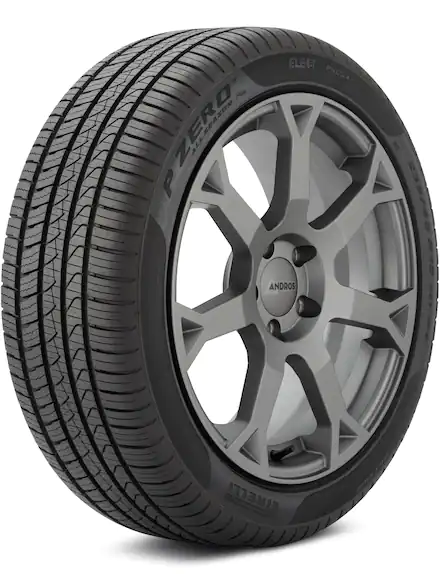
3. Pirelli P Zero All Season Plus Elect
The Pirelli P Zero All Season Plus Elect is specifically designed for electric vehicle drivers who value year-round traction and noise comfort. This tire is quite popular among Tesla electric car owners. It comes with an unlimited time/50,000-mile warranty and a 30-day trial period.
Overall Rating
| Treadwear | 8.0 |
| Dry Traction | 8.7 |
| Wet Traction | 8.0 |
| Winter Performance | 7.2 |
| Noise and Comfort | 9.2 |
| Price | 8.5 |
Pros
Cons
Our Verdict
With its asymmetric tread design, Pirelli P Zero All Season Plus Elect delivers exceptional performance and stability, especially for electric motors. The unique tread design also enhances cornering capabilities.
One standout feature is Pirelli's Noise Cancelling System technology, which employs a layer of sound-absorbing foam on the tire's inner liner. This innovation has won over Tesla drivers who appreciate the quiet ride and efficiency it provides. However, we observe that some users experience a slight reduction in their vehicle's range.
The P Zero All Season Plus Elect boasts improved wet and winter traction, making it a reliable choice for various road conditions. However, the real-world performance indicates that the wet and snow traction is not as good as a standard all-season tire.
Although it's not three-peak mountain snowflake (3PMSF) rated, customers have reported impressive performance in 3 to 6 inches of snow.
If you're an electric vehicle driver seeking a comfortable and efficient ride, we highly recommend the Pirelli P Zero All Season Plus Elect for you.
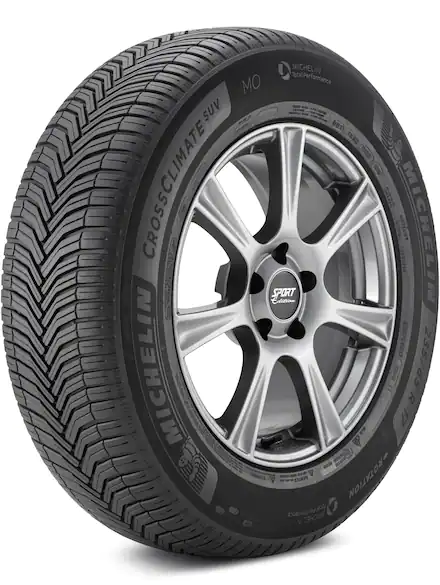
4. Michelin CrossClimate SUV
The Michelin CrossClimate SUV is a top choice for SUV and crossover drivers seeking an all-season tire with exceptional performance in snow. It comes with a 6-year or 50,000-mile warranty and a 60-day satisfaction guarantee.
Overall Rating
| Treadwear | 8.8 |
| Dry Traction | 9.8 |
| Wet Traction | 9.5 |
| Winter Performance | 9.2 |
| Noise and Comfort | 8.5 |
| Price | 8.5 |
Pros
Cons
Our Verdict
Michelin CrossClimate SUV has a unique bevel-edged tread block design that enhances traction on wet tracks, ice, and snowy roads and provides excellent grip and corner stability on dry tracks and highways.
In comparison to the Michelin CrossClimate2, we observe that the CrossClimate SUV has better snow traction and is rated with a three-peak mountain snowflake (3PMSF) symbol, while the CrossClimate2 is not a 3PMSF-rated tire.
Although some users have reported noise issues on highways, they also praise the CrossClimate SUV's impressive performance on wet, dry, and snowy roads, as well as in heavy rain and snowstorms. If you can compromise on noise, this tire offers outstanding performance in a variety of conditions.
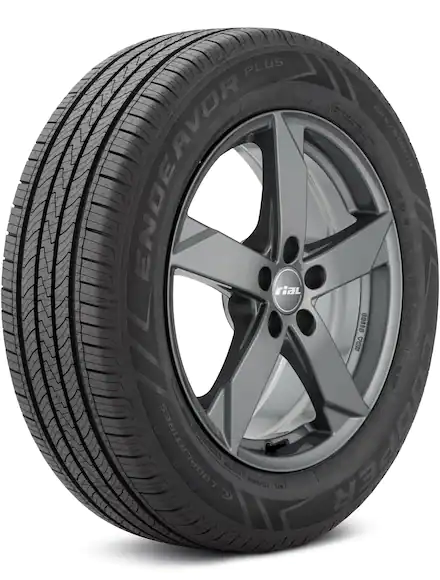
5. Cooper Endeavor Plus
The Cooper Endeavor Plus is a top-selling all-season tire ideal for drivers of light trucks, SUVs, crossovers, and vans seeking exceptional dry traction. The Cooper Endeavor Plus comes with a 6-year or 65,000-mile warranty and a 45-day road test guarantee.
Overall Rating
| Treadwear | 9.4 |
| Dry Traction | 9.3 |
| Wet Traction | 8.8 |
| Winter Performance | 8.3 |
| Noise and Comfort | 8.8 |
| Price | 9.1 |
Pros
Cons
Our Verdict
As a crossover/SUV touring tire, it offers improved steering response and handling on dry roads, ensuring a smooth and confident driving experience.
While the Cooper Endeavor Plus boasts a good tread life, some customers have reported noise issues on highways, despite the tire's claim to be quiet. However, overall, users are satisfied with its performance in wet, dry, and light snow conditions.
Please note that this tire is not rated with a three-peak mountain snowflake (3PMSF) symbol. If dry traction is a priority for you, the Cooper Endeavor Plus is a top choice in the all-season tire category.
Pros
Cons
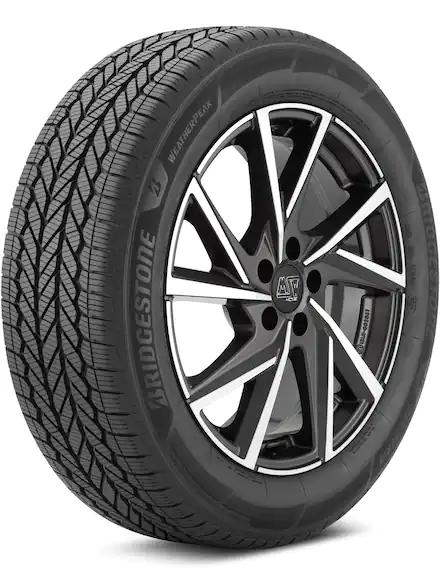
6. Bridgestone WeatherPeak
The Bridgestone WeatherPeak is a grand touring all-season and all-weather tire designed for drivers of coupes, SUVs, crossovers, sedans, and minivans who value exceptional handling. Bridgestone offers a 5-year/70,000 miles treadwear warranty along with a 90-day buy-and-try guarantee for this tire.
Overall Rating
| Treadwear | 8.6 |
| Dry Traction | 8.8 |
| Wet Traction | 9.6 |
| Winter Performance | 9.1 |
| Noise and Comfort | 8.6 |
| Price | 8.9 |
Pros
Cons
Our Verdict
Bridgestone WeatherPeak tire's performance rivals the Michelin CrossClimate SUV in terms of deep snow traction, offering a one-size-fits-all solution for various driving conditions.
Featuring a unique sipes design, the WeatherPeak ensures outstanding handling and grip in all conditions. The Bridgestone WeatherPeak meets the industry's severe snow service requirements and is branded with the three-peak mountain snowflake (3PMSF) symbol.
Drivers love its quiet ride, hydroplaning resistance, and snow traction capabilities. However, some users have reported concerns about its short tread life and average dry traction, which are valid points to consider.
Read our full Bridgestone WeatherPeak Review
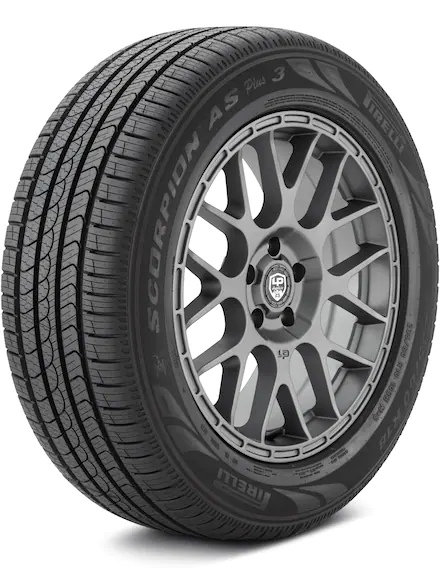
7. Pirelli Scorpion AS Plus 3
The Pirelli Scorpion AS Plus 3 is a crossover/SUV touring all-season tire that offers an exceptional combination of high ride quality and extra-long tread life. It comes with an unlimited time or 70,000-mile warranty and a 30-day trial period.
Overall Rating
| Treadwear | 9.4 |
| Dry Traction | 9.3 |
| Wet Traction | 9.1 |
| Winter Performance | 8.1 |
| Noise and Comfort | 9.1 |
| Price | 8.7 |
Pros
Cons
Our Verdict
Pirelli Scorpion AS Plus 3 tire uses special polymer compounds and an advanced tread design that makes this tire lighter than its competitors, resulting in better mileage for your vehicle.
While the Scorpion AS Plus 3 lacks the three-peak mountain snowflake (3PMSF) symbol rating, we see that the majority of consumers report its excellent performance in winter conditions especially in the snow.
This tire has received high ratings from customers for its balanced performance across all seasons and in a variety of driving conditions. Although some users have reported noise issues, most praise the tire for its comfortable ride.
Read our full Pirelli Scorpion AS Plus 3 Review
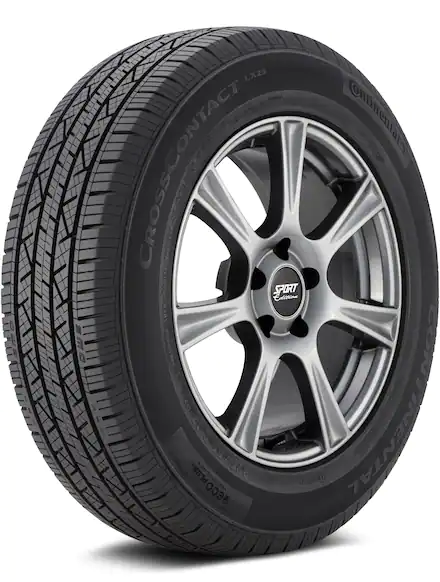
8. Continental CrossContact LX25
The Continental CrossContact LX25 is designed for crossovers and small SUVs. Known for providing super-comfortable rides, this tire is a favorite choice for luxury and family car owners. It comes with a 6 Years / 70,000 Miles warranty and 60-day trial period.
Overall Rating
| Treadwear | 9.0 |
| Dry Traction | 9.2 |
| Wet Traction | 9.1 |
| Winter Performance | 8.3 |
| Noise and Comfort | 9.4 |
| Price | 9.0 |
Pros
Cons
Our Verdict
This tire can handle light snow, and its wide grooves help resist hydroplaning. The latest tread material ensures extra tread life and durability.
However, it does not have the three-peak mountain snowflake (3PMSF) branding, meaning it's not suitable for deep snow and ice.
Many buyers praise the CrossContact LX25 for its long tread life, improved gas mileage, and optimal performance in various conditions, including dry, rainy, and winter seasons. Some users complained about noise issues on highways. However, on further analysis, we found that these are isolated issues and may occur possibly due to incorrect balancing and alignment.
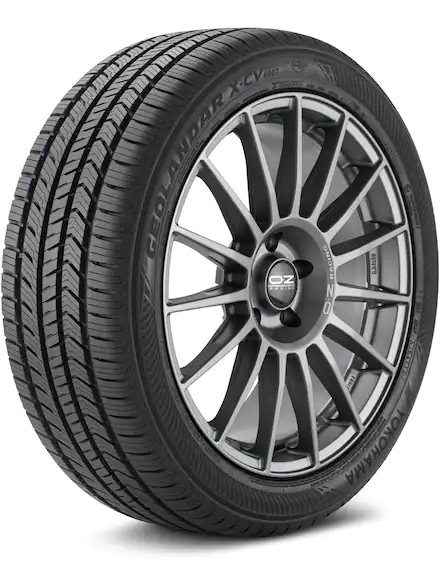
9. Yokohama Geolandar X-CV
The Yokohama Geolandar X-CV is designed for powerful crossovers and SUVs. The tire comes with a 5-year or 50,000-mile warranty and a 30-day test drive.
Overall Rating
| Treadwear | 8.6 |
| Dry Traction | 9.1 |
| Wet Traction | 8.8 |
| Winter Performance | 8.3 |
| Noise and Comfort | 9.1 |
| Price | 8.8 |
Pros
Cons
Our Verdict
Yokohama Geolandar X-CV is optimized for dry traction and noise comfort, ensuring a smooth and quiet ride. I am impressed with its good cornering capabilities on sharp turns. However, tread life might be a concern, typically lasting around 45,000 miles. But considering its price, it offers great value for money.
Its unique tread design features four deep and wide circumferential grooves, providing ultimate braking control on wet and slippery roads as well as excellent hydroplaning resistance.
Please note that it does not have the three-peak mountain snowflake (3PMSF) branding. If you want to use it in winter, we recommend using it only in light snow.
Users have reported exceptional hydroplaning resistance and comfortable rides with very low noise levels.
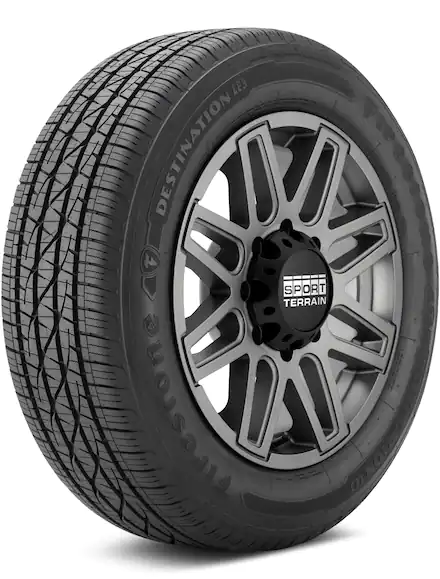
10. Firestone Destination LE3
The Firestone Destination LE3 is a highway specialist, offering a quiet ride for drivers of light trucks, crossovers, and SUVs. With a tread life that holds up well, this tire comes with a 5-year or 70,000-mile warranty and a 90-day Buy & Try Guarantee.
Overall Rating
| Treadwear | 8.9 |
| Dry Traction | 9.2 |
| Wet Traction | 8.9 |
| Winter Performance | 8.2 |
| Noise and Comfort | 9.0 |
| Price | 9.3 |
Pros
Cons
Our Verdict
Firestone Destination LE3's design includes four deep and wide circumferential grooves, just like the Yokohama Geolander X-CV, which provide optimum hydroplaning resistance and grip on wet roads.
Moreover, you can expect smooth and noise-free rides on highways along with good lateral traction and steering response.
Please note that Destination LE3 does not have the three-peak mountain snowflake (3PMSF) rating. Users report average performance in deep snow, so it only suits light snow conditions.
Most users are satisfied with the Destination LE3's tread life and comfortable ride, making it a great value-for-money tire.
How We Select the Best Tires
We don’t just pick the tires randomly. There is a lot of work behind suggesting the lists of the best possible tires for readers and buyers. We adopt a multi-dimensional approach rather than just a 'single person experience'. Our lists and reviews are a collective wisdom of many users rather than a single user.
To determine the best tires, we undertake extensive market research, meticulously examine the specifications of each tire, and carry out a very thorough analysis of user reviews from top retailers. Finally, our keen tire experts apply their experience and expertise and provide a well-rounded assessment to create the final list of the best possible tires. Read our detailed review process.
Expert Note
Although all-season tires offer optimum performance throughout the year with mild summer and winter, they are not the best in extreme heat or deep snow & ice. For these conditions, the dedicated summer and winter tires are more suitable.
Buying Guide: What to Look for In An All-Season Tire?
When searching for the best all-season tire, it's essential to consider several factors that contribute to a tire's overall performance and suitability for your specific needs.
- Traction and Grip: Look for a tire that offers excellent traction and grip on both wet and dry surfaces. This will ensure a safe and comfortable driving experience throughout the year.
- Snow and Ice Performance: While all-season tires are not designed for extreme winter conditions, they should still provide adequate traction in light snow and icy conditions. Check for the three-peak mountain snowflake (3PMSF) symbol, if you frequently encounter snow or live in colder regions.
- Tread Life and Durability: A longer tread life means more value for your investment. Opt for tires made from high-quality materials and advanced tread compounds that promise extended durability.
- Price and Warranty: Consider the tire's price and warranty offerings, such as tread life warranties and satisfaction guarantees. A good balance between cost and quality is key to finding the best all-season tire for your needs.
What Is the Difference Between All-Season and All-Weather Tires?
All-weather tires are considered a subset of all-season tires. The major difference between all-season and all-weather tires lies in their performance in winter conditions. All-season tires are designed to provide good performance in a variety of mild conditions, including light snow. However, they are not specifically designed for harsh winter conditions.
All-weather tires are built to handle more severe weather conditions whether it is heavy rain, extreme hot, or heavy snow and ice. They have a more aggressive tread design than all-season tires and carry the three-peak mountain snowflake (3PMSF) symbol.
Is It Possible To Use All-Season Tires Entire Year?
Yes, it is possible to use all-season tires throughout the year, as the manufacturers design them to provide adequate performance in a variety of mild weather conditions, including light snow.
However, they may not perform well in extreme winter conditions or heavy snow compared to dedicated winter tires. In this case, an all-season tire with a 3PMSF rating can be used alternatively. If you want ultimate winter performance, then go for a dedicated winter tire.
Under What Circumstances Are All-Season Tires Not Suitable?
All-season tires are generally not designed for challenging off-road terrains. So for off-roading activities, specialized off-road or all-terrain tires would be a better choice.
Moreover, All-season tires are generally not suitable for harsh winter situations and deep snow.
For this, you should opt for dedicated winter & snow tires although there are a few all-season tires for snow having a 3PMSF rating that you can still trust.
Based on our experience, it is obvious that no tire is perfect, nor is any tire absolutely bad. Issues may arise when individuals neglect tire care, fail to rotate the tires on schedule, or do not inflate them according to the recommended pressure. To maximize the benefits of a tire, always rotate them every 5,000 miles, inflate it to the suggested pressure, avoid parking the vehicle in direct sunlight, especially during the summer season, and routinely check for alignment and balancing.
Frequently Asked Questions (FAQs)
Which All-Season Tire Is Best for Crossovers?
Pirelli Scorpion AS Plus 3 and The Michelin CrossClimate SUV are excellent choices as they are specifically designed for SUVs and crossovers. They provide year-round traction and perform well in various weather conditions including light snow.
How to Find the Right Size of All-Season Tires for Your Vehicle?
The tire size information can be found on the sidewall of your current tires. The tire size is a series of numbers and letters, such as "P225/55R17". Here's how you can decode it:
"P" indicates a passenger tire.
"225" is the tire width in millimeters.
"55" is the aspect ratio, which is the height of the sidewall as a percentage of the width.
"R" denotes radial construction.
"17" is the wheel diameter in inches.
You can also check the owner’s manual or a tire placard to get the tire size information.
The tire placard is located on the driver's side doorjamb, inside the glove box, or on the fuel door. This placard lists the original tire size, load-carrying capacity, and recommended inflation pressure for your vehicle.
Is It Necessary to Change All Four Tires at Once?
It is generally recommended to change all four tires at once, especially if they have similar wear and tear. This ensures that all tires have the same traction, handling, and stability characteristics, which contributes to a more balanced and predictable driving experience.
However, if you have a tire that sustains significant damage or wears out faster than the others, you may only need to replace that particular tire. In some cases, you should replace the tires on the same axle (both front or rear tires).
What Is the Price Range for All-Season Tires?
Generally, you can expect to pay anywhere from $70 to $200 per tire. Premium brand tires tend to be more expensive, while budget-friendly options may cost less. The price range for all-season tires varies greatly depending on the brand, tire size, region, retailer, and performance characteristics.
